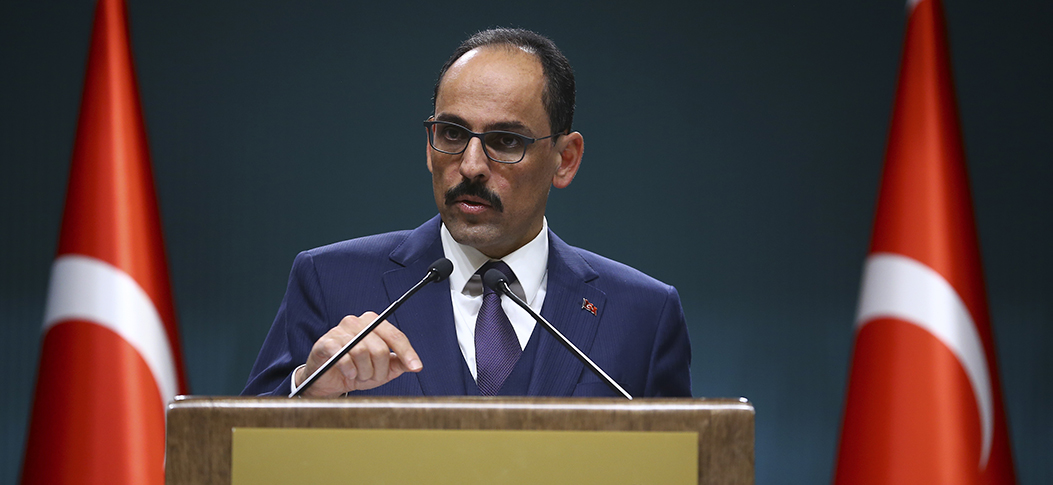"Turkish, Russian leaders to discuss Syria over phone"

Presidential spokesperson İbrahim Kalın spoke to reporters following a Cabinet meeting at the presidential complex.
The Turkish and Russian presidents will speak about Syria on the phone Wednesday night, said Turkey’s presidential spokesperson.
Ibrahim Kalin said Recep Tayyip Erdogan and his Russian counterpart Vladimir Putin will have a phone conversation about the situation in Syria.
Erdogan is also expected to co-chair the Global Refugee Forum in Geneva next week, Kalin said.
The first Global Refugee Forum, set for Dec. 17-18, will be hosted by the UN High Commissioner for Refugees (UNHCR) to discuss the global refugee crisis and its regional dimensions, he added.
The forum will focus on such topics as burden- and responsibility-sharing, education, jobs, livelihoods, energy and infrastructure, solutions, and protection capacity.
After the forum, Erdogan will pay a visit to Malaysia to discuss issues facing the Islamic world at a summit with the participation of Pakistan, Iran, Indonesia, Malaysia, and Turkey, Kalin said.
On efforts to reach a political solution for war-torn Syria, Kalin underlined Turkey’s support for the work of the Constitutional Committee.
“We express here strongly that Turkey condemns the steps of the regime in the direction of imposing and undermining the Constitutional Committee,” he added, calling on the Syrian regime to stop taking steps to derail the committee’s talks.
Possible return of Syrian refugees
On the possible return of Syrian refugees to a safe zone, he said it will be based on three main UN criteria, to ensure a "safe, voluntary, honorable return."
Turkish, German, French, and British leaders agreed last week to help Syrian refugees voluntarily return to their homeland, also saying that humanitarian access -- including across the border -- must be ensured in Syria.
Turkey launched Operation Peace Spring on Oct. 9 to eliminate YPG/PKK terrorists from northern Syria east of the Euphrates River in order to secure Turkey’s borders, aid in the safe return of Syrian refugees, and ensure Syria’s territorial integrity.
Ankara wants YPG/PKK terrorists to withdraw from the region so a safe zone can be created to pave the way for the safe return of some 2 million refugees.
In its more than 30-year terror campaign against Turkey, the PKK -- listed as a terrorist organization by Turkey, the U.S. and EU -- has been responsible for the deaths of nearly 40,000 people, including women, children and infants. The terrorist YPG is the PKK’s Syrian offshoot.
’F-35 program became US domestic issue’
The dispute between Turkey and the U.S. over F-35 fighter jets is no longer a technical or defense industry matter but a domestic U.S. political issue, said Kalin.
U.S. lawmakers announced on Tuesday that they are considering purchasing for the U.S. Air Force F-35s that are supposed to be Turkey’s under the fighter jet program.
This July, Turkey’s acquisition of Russian S-400 defense systems prompted the Trump administration to suspend Turkey from the F-35 program. The U.S. claims the system would be a security risk and is incompatible with NATO systems.
Turkey, however, counters that the S-400 would not be integrated into NATO systems and would not pose a threat to the alliance.
Turkish officials have also proposed setting up a commission to study the issue, but has yet to get a positive response from the U.S.
’No request from Libya on troops’
Asked about possible Turkish military support to Libya -- an issue that came up during an interview with the president this Monday -- Kalin said: "There is currently no request from Libya asking for Turkish troops."
In a televised interview with Erdogan, asked what would happen if Libya’s Government of National Accord (GNA) were to request military assistance, the president said: "In case of such an invitation, Turkey will decide itself about what kind of initiative to undertake."
Kalin also cited Erdogan’s remarks saying there is a covenant ground based on agreements between Turkey and Libya for maritime jurisdiction as well as military and security cooperation, the subjects of two pacts the countries signed on Nov. 27.
The memorandum determining both countries’ marine jurisdictions rejects unilateral and illegal activities by other regional countries and international firms and aims to protect the rights of both countries in line with the international law of the sea.
According to the U.S. Geological Survey, the Mediterranean region may have millions of barrels of oil and trillions of cubic meters of natural gas, worth hundreds of billions of dollars.
Turkey, for its part, has urged regional countries to take an equality-based approach, but its calls have largely fallen on deaf ears. Turkey continues its drilling and discovery operations in the region under the protection of the country’s navy.
Since 2011, when longtime ruler Muammar Gaddafi was ousted and killed, Libya has seen the emergence of two rival seats of power: One in eastern Libya, to which military commander Khalifa Haftar is affiliated, and the Government of National Accord, which enjoys UN recognition.

